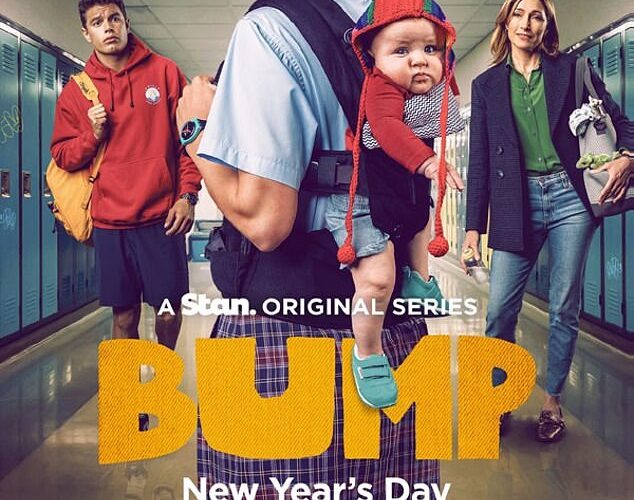Bump is a 10-part heart-warming Australian comedy series that recently made its debut on CBC Gem, on June 18th. The series follows Oly, a teenaged high-schooler who realizes she is pregnant the very same day she gives birth to her daughter. We had the chance to talk to its protagonist Nathalie Morris and co-creator Claudia Karvan about the series’ production, its representation of the Latino-Australian community, and Oly’s feminist purpose.
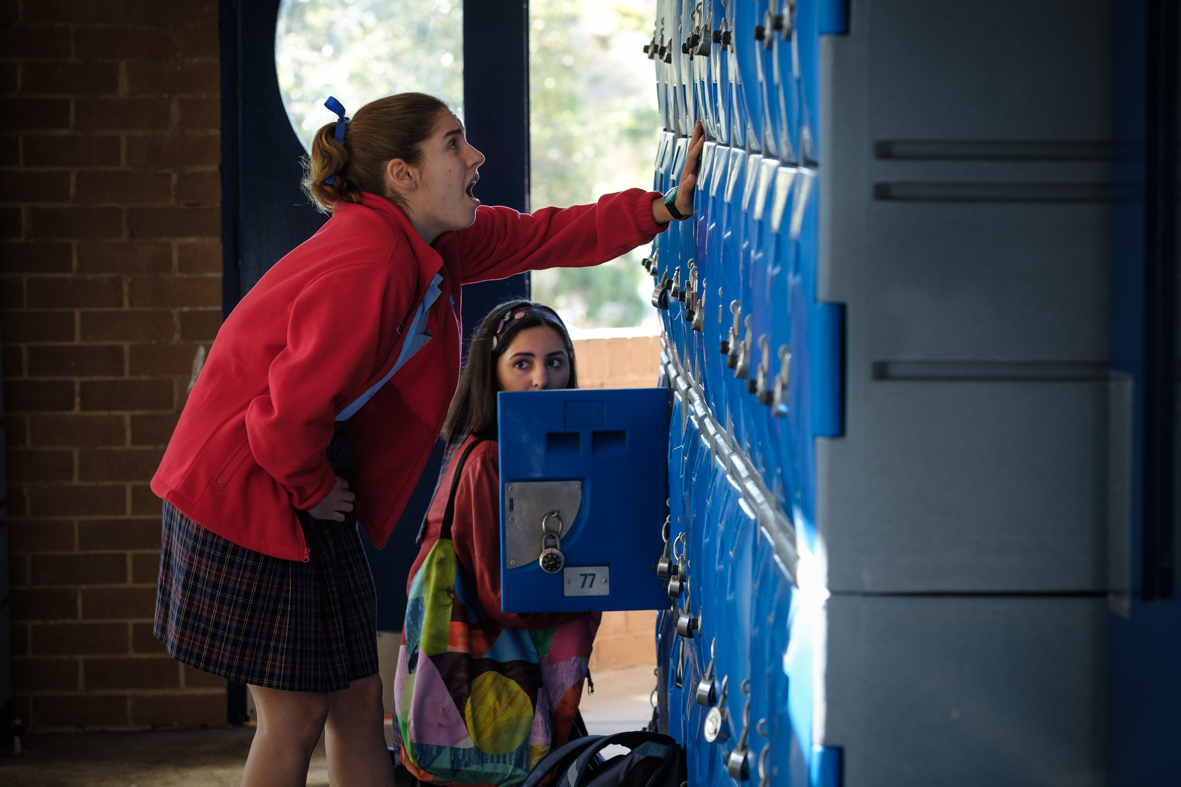
Courtesy of CBC Gem.
Ultimately, Bump is a series about family, love, and discovery. The ambitious Oly is forced to face an unexpected and unprecedented situation that brings her closer to her family and makes her reconsider her life, including who she is in love with. Bump was co-created by Kelsey Munro and Claudia Karvan, who plays Oly’s mother. Munro and Karvan also manage to swiftly introduce and authentically depict the Latino diaspora in Australia –an underrepresented community in media yet existent in Australia– for reasons that Karvan explained in our interview.
Read the full interview below or watch an extract here:
How was the idea for the series born?
CLAUDIA KARVAN: Kelsey Monroe, who is the co-creator with me, she was on maternity leave, and she came up with the idea but decided that it would be better to deal with the complexity of motherhood through the eyes of a teenage girl who didn’t choose to have a baby or become a mother. And she had a document, and I got introduced to her through producers that I’ve worked with for over 20 years. They connected us, they thought we’d get on really well. And then we developed it from there and we decided to bring the father of the baby into the show and his whole family was South American so we brought up a cultural element to the concept, and also a very romantic element where we sort of put the cart before the horse, where you fall in love with the father of your child after the baby is born.
From the very beginning, we notice Oly is a complex character with a hard shell. How did you, Nathalie, imagine she was feeling during the first episodes of the series? Who is she to you?
NATHALIE MORRIS: When I read the scripts, she reminded me of how I was in high school. Just like a perfectionist, high achiever, lots of pressure on herself, very kind of single-minded and stubborn and a bit witty and kind of thinks she’s the smartest person in the room and– very smart in a lot of ways but very immature in quite important ways. So, she reminded me of myself a lot and I think I just played into that at the beginning. In terms of how she feels about what’s happened to her, I think I could relate to having, not to the same extent, that having curveballs thrown at me in my life and how I dealt with it. And I think she really felt quite similar to how we felt with the babies, because I think we just tapped into that in terms of like, we didn’t know how to hold the baby, we didn’t know anything about babies. I couldn’t imagine becoming a mom now or in the near future to become a mom, so I think we just kind of experienced that at the same time as our characters.
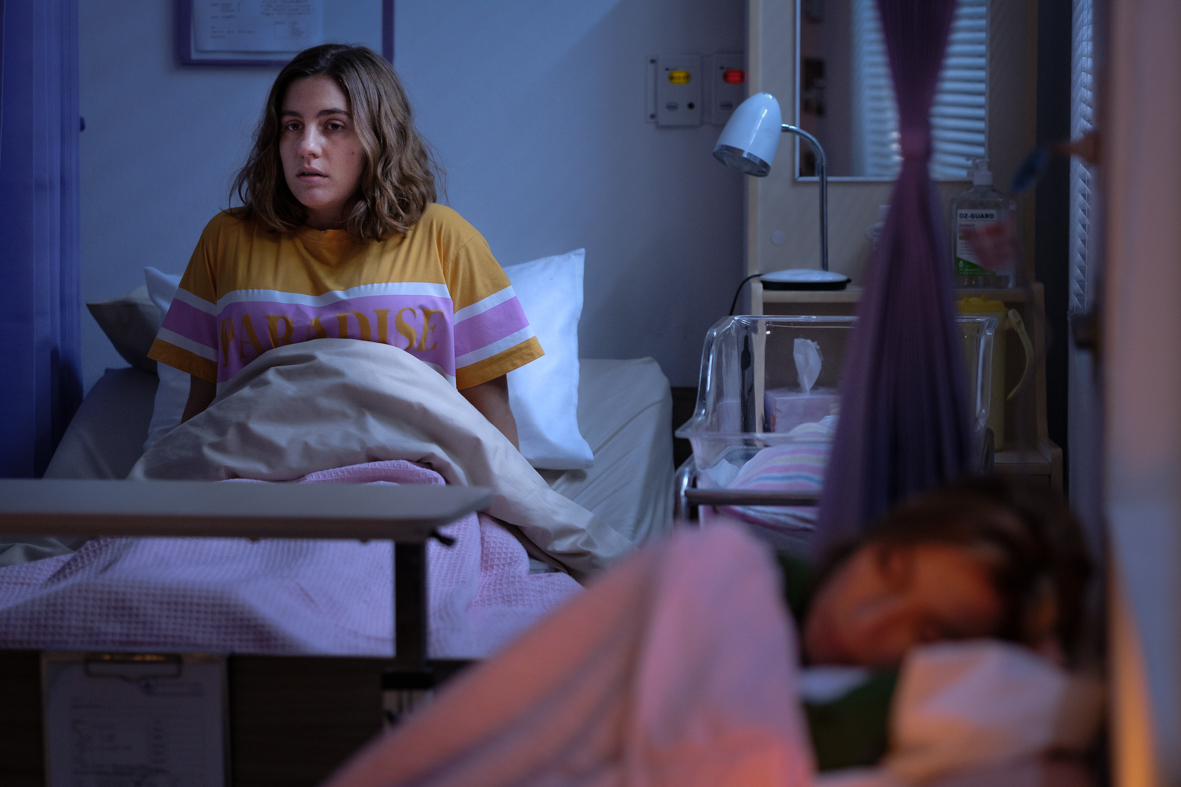
Courtesy of CBC Gem.
How did you both go around forging this relationship between mother and daughter on screen?
NATHALIE MORRIS: Ah, well, I felt like that kind of sparring between Holly and Angie we just sort of started to do on set. Don’t you think?
CLAUDIA KARVAN: Yeah. I met Nat over Zoom, because she was in New Zealand, and– I don’t know, the minute Nat appeared on the computer screen, I just felt an instant connection with her, and I can’t put my finger on exactly what that was but–
NATHALIE MORRIS: We read the same books then we were, or we were reading the same book, we just had a lot of the same like experiences or, I went to the same school as your daughter in Bali. There were all these weird things that we could connect on.
CLAUDIA KARVAN: Yeah, so I guess that didn’t require that sort of chemistry. It didn’t require really any rehearsals or any sort of conscious effort, we were blessed, and I absolutely adore Nat, I’m totally in love with her. And the funny thing was, I saw her audition I was like, “Whoa, this girl is astonishingly talented,” and she just nailed the show like the tone of it, the timing, the humour, her character. And so as a producer, and our co-creator, I was like, “Oh, wow, this is so great, we’ve got our Oli.” It was such a sense of relief, and then it wasn’t until like a few weeks later the actor in me was like, “Oh! And I get to act with her! This is gonna be so good!” We’re very lucky. It’s not always like that.
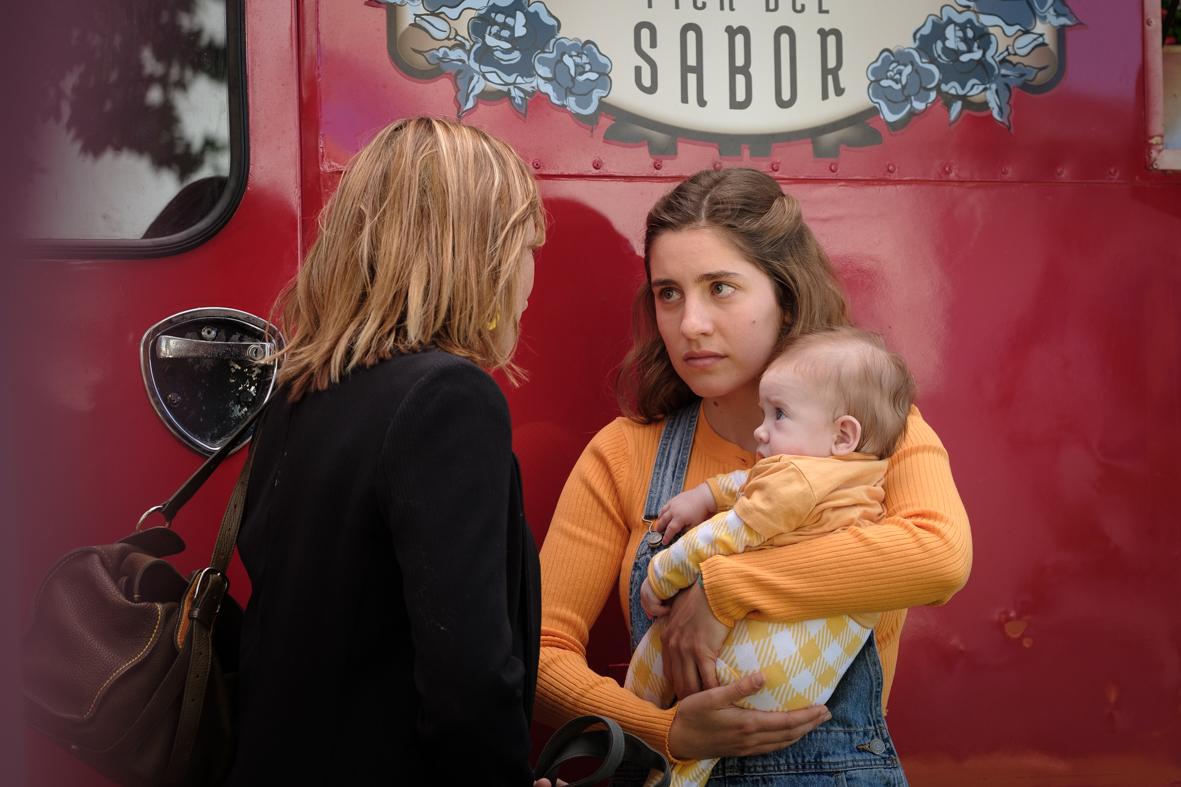
Courtesy of CBC Gem.
NATHALIE MORRIS: It was like so, here we go. Just like back and forth, complementing each other but it was super easy to form a connection with Claudia. She’s so welcoming and trusting and open and fun. Yeah, it was extremely like just from the get-go, it was easy.
CLAUDIA KARVAN: And I think I remember being a, I was actually not as well adjusted as Nat when I was a young actress. But I just always sort of remember being a young actress and, you know, how lovely it is to have a lot of communication and a lot of support. Not that Nat probably needed it because she’s pretty self-possessed.
NATHALIE MORRIS: That’s true. You did support us through lots of things, like all the publicity stuff as well. That was great. I feel very lucky.
Claudia, you included Latino families thoughtfully and purposefully in the plot. Can you tell us more about your motivation behind this decision?
CLAUDIA KARVAN: Yes, of course! I’ve always been curious about South America since I was young, but we never had the direct flight going straight to South America from Oakland to Santiago. So it’s really hard to get there. I was also a vegetarian and I knew that there’s a lot of meat-eating in [South America]. And I was like, “Oh, what am I gonna eat if I go to South America?” So I sort of travelled to different areas of the world. Then, eventually, when my son was 10 years old, he came home from school and he said, “Mom, have you heard of the Galapagos Islands?” And I was like, “Yes, I heard of them when I was 10. And I’ve always wanted to go and let’s shake on it. It’s a deal. We’re going to the Galapagos Islands within the year.” And so he and I did a boat trip around the Galapagos Islands and I was ashamed to not be able to say ‘Hola’ or ‘Gracias’ or I knew not one word of español. And I’m fascinated by languages, I tried to learn French and Italian and Indonesian and German at school. And so I sort of fell in love with the language. I started dancing salsa. I went back, I went to Cuba and Mexico and back to Ecuador and Peru and Chile. And then I’ve discovered there’s a whole community here and in Sydney.
So was it important for you to show that the Latino community existed in Australia?
CLAUDIA KARVAN: Yeah, very, because I’ve lived my whole life in Sydney, and I had no idea that you can go out dancing salsa, four nights a week. It was really interesting to see my city, my home city, through the Latino community’s eyes, I felt like I was in a different city. And yeah, that vibrant community is not visible on our television screens. So it was very exciting to give them stories.
That’s good to hear. Having a baby with someone who is nearly a stranger is not an uncommon reality. How did you intend for Oli and Santiago to overcome this bridge between them? What message were you trying to portray?
CLAUDIA KARVAN: We, look, to be honest, I think even though we’re quite hard-hearted, cynical women, I think we’re also very romantic. And I guess we sort of believed that there was a reason Oli behaved like she did that night. And that there was a sort of unconscious attraction, which was real. (Let me get emotional.) And I guess we just believe in love, and we want people’s lives to be, you know, beautiful. So also, you know, we’re all mothers or Kelsey and I are mothers. And there is an extraordinary evolution that happens when you share a child with someone and you see a softness to them and there’s just an immediate intimacy that you share, that you would never share with another teenage boy. So that sort of laid the groundwork for them being able to connect and learn about each other because they love the same little human.
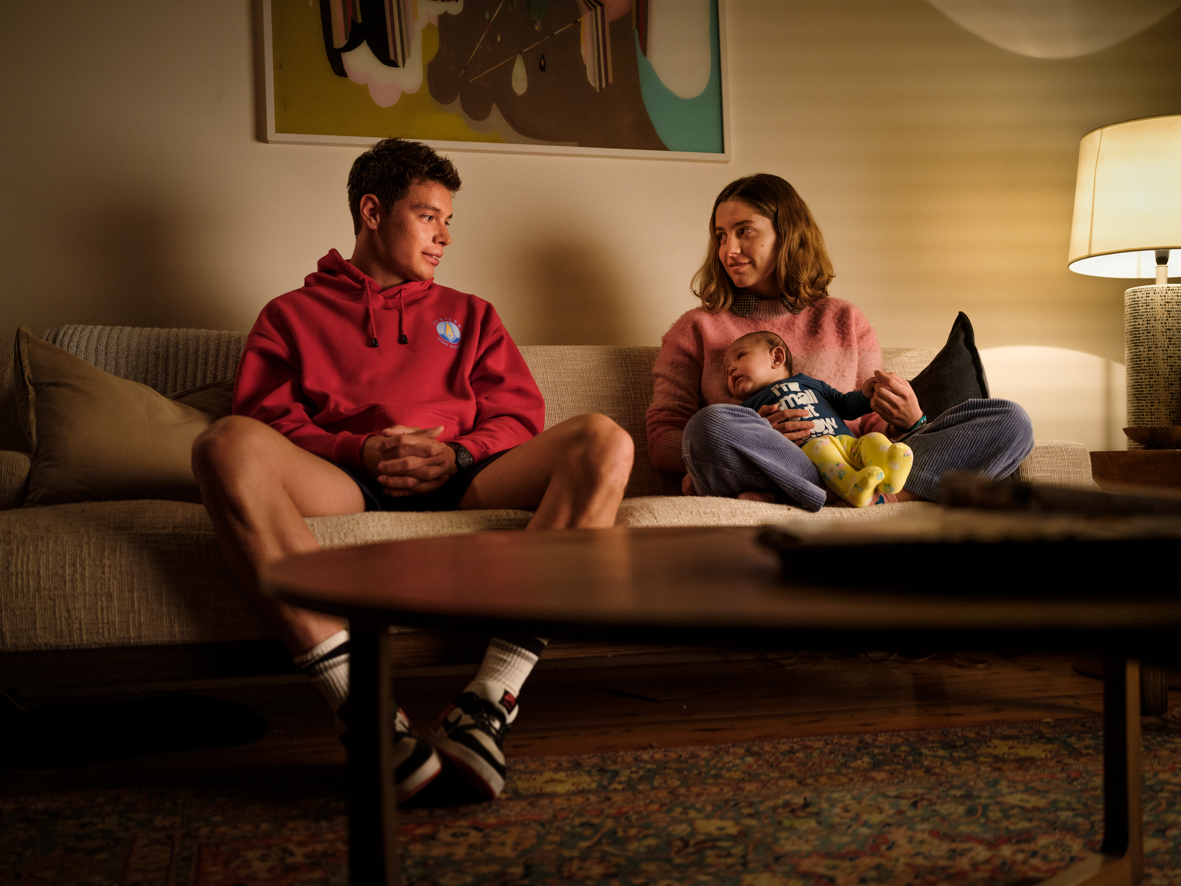
Courtesy of CBC Gem.
During the first three episodes, I noticed Oly was inspired by her feminist motivations. What was the underlying political intention with the series in this aspect?
NATHALIE MORRIS: I think that in a way, Oly at the beginning is inspired by all of these really significant powerful feminist women, you know, whether they be politicians or activists of any kind. And she, I think, throughout the series, a lot of her ideas that she has lived through are kind of challenged, because now she has a baby, and she has fallen in love. And she is kind of idealistic at the start.
And then, she has to discover that, for example, it’s not a series where she goes, “I’m going to look after the baby, and I can do it all myself,” you know, she’s like, “Oh, no, I am in love” and “Oh, no, the father does need to be part of the baby’s life.” There’s a lot of compromises that have to be made. And so I think that the show is kind of unpacking a lot of those feminist ideas in a way. I mean, I think the political intention of the show is, the show celebrates things going wrong, and people coming together to fix them. And life being messier than we think it’s going to be. And it celebrates, embracing, you know, difference and embracing failure and accepting one another, and kind of just muddling through. I mean, it’s definitely opened my eyes up to the difficulties of being a mother and trying to have a career and trying to get an education. And I think it just unpacks a lot of that stuff.
CLAUDIA KARVAN: When Kelsey first drew up the pitch document for us to go and pitch to networks, one of the first lines were “This is feminist television.” And I was like, “Whoa!”. She had not had any experience in our industry. I’ve been in our industry since I was 10 years old. And I wasn’t aware of how sort of deferential I am to the fact that most of the gatekeepers are men. And so I was like, “Do we want to say that it’s feminist television? Because we might scare people off.” Also, you know, can a feminist TV show be funny? I was concerned about that. But it’s definitely a very clear objective that we want the female voices to be very clear. And I think this is happening all around the world now, since the #MeToo movement. You know, you watch a show like Mare Of Eastown that is a very, very strong, very fresh female voice in that in the character of Kate Winslet. Like that’s groundbreaking stuff. So, yeah, that was always our very clear motivation, we don’t want to shy away from feminism, even though it has these, you know, complex, some perceptions.
Also, the women’s movements in Argentina and Chile are phenomenal. Like, South American women are like ‘Wow!’ So vocal and, you know, I was in Santiago during the recent unrest in October last year where, you know, after they rose the tickets for the train and the women active in the marches and political activity and even the graffiti on the streets like there’s vaginas sprayed everywhere! (Laughs). That’s radical.
How do you feel about the series now premiering in Canada? Was it something you had imagined?
NATHALIE MORRIS: No! I didn’t imagine the imagined that it would even– I mean, I’d love the scripts. And I just was like “Okay, I’ve got this role. I’m going to do this role,” but I didn’t imagine that it would even be as big as it was in Australia, but overseas. I feel like if we did know that, we would have like seriously messed it up.
I think it’s really cool and I’m excited to see what people from outside of Australia think of the show because there’s a lot of the feedback that we’ve gotten is that it’s very Australian, it feels like the Australia of today. And it is, it is very Australian. So I’m excited to see whether the humour lands– I’m sure. I’m sure it’ll be received well, but yeah, so exciting.
CLAUDIA KARVAN: Yeah, I don’t think we’ve made a lot of announcements, but we’ve got some really fantastic overseas sales. So, for a very, very specifically Australian show to be embraced internationally is really wild. Like, it’s sort of beyond all of our expectations. It’s very difficult to get international sales for Australian products. And yet it’ll be fascinating to read about the responses. And it’s so easy now through social media to get very genuine responses to your shows. It’s really gratifying.
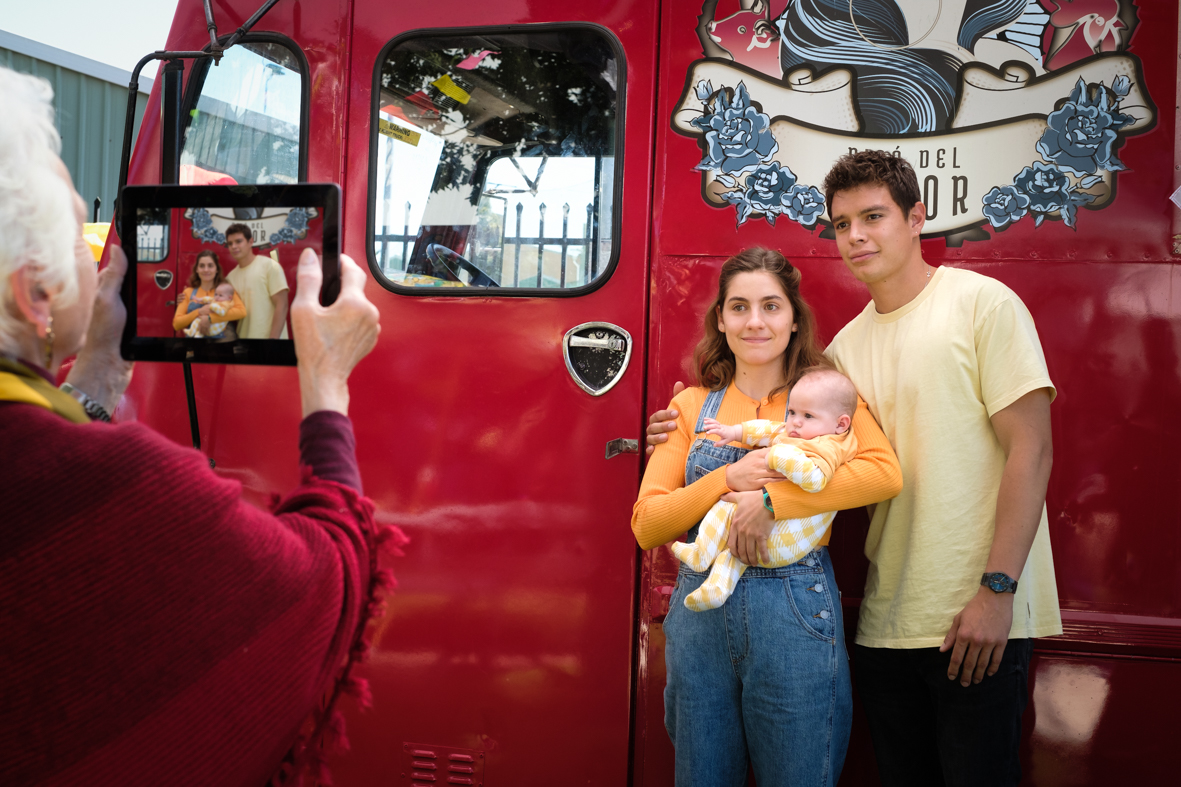
Courtesy of CBC Gem.
And finally, how would you invite people to watch Bump now that it’s getting to CBC?
CLAUDIA KARVAN: I think it’s a really important show for right now. It feels like, even though we shot it during the pandemic, we didn’t develop it knowing a pandemic was coming. But I think the show is really life-affirming. It’s optimistic. It’s about relationships and connection. And I think it’s really appropriate. The tone of the show is really appropriate for now. It’s quite nurturing. It’s emotional. But it’s essentially optimistic.
NATHALIE MORRIS: It’s also very funny and witty and intelligent. I’ve just started reading the season two script, and it just feels very like today, like the language that we’re using, the relationships. It also is kind of everybody. When we were making it, I didn’t know who was going to watch it, like whether it was going to be for teenagers or whether it was going to be for mothers or, you know, like clothing more Claudia’s generation, I had no idea. And then, since it’s come out, we realized that everybody has watched it and gotten different things out of that, like 13-year-olds to my grandparents have watched it and they love it.
Yeah, it’s got a surprisingly broad appeal that sort of shocked us all the most.


